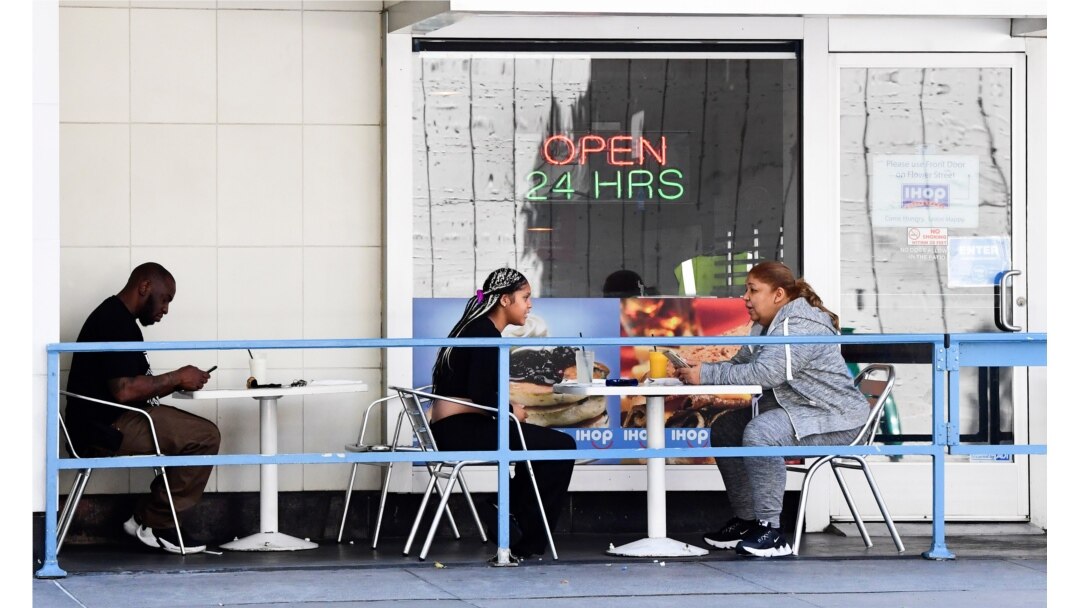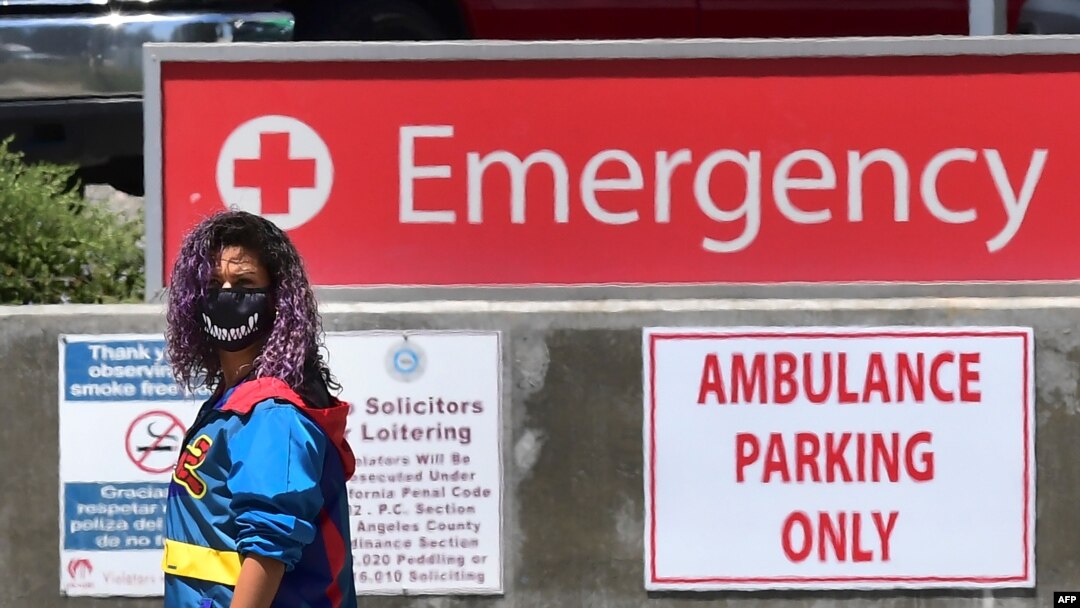World leaders cannot choose between the economy and saving lives, the top U.S. infectious disease expert said.
"You don't want to balance lives against the economy. So let's get public health to help us to get the economy open as opposed to two opposing forces," Dr. Anthony Fauci told The Journal of the American Medical Association network Thursday.
Fauci spoke as governors across the United States are once again closing bars and restaurants and reimposing restrictions because of an alarming spike in COVID-19 cases.
Forty of 50 U.S. states are reporting a rise in new cases, and records for the number of new cases in the U.S. are being broken every day.

Patrons dine outdoor in Los Angeles, California, July 2, 2020, a day after new regulations came into effect banning all indoor dining as coronavirus cases statewide hit record highs.
The jump in COVID-19 numbers is blamed in part on what New Jersey Governor Phil Murphy called "knucklehead behavior" – people not wearing masks or practicing social distancing.
"We're in an unprecedented pandemic," Fauci said. "We haven't seen anything like this for the last 102 years ... and this is something that we need to take very seriously because there's so many implications of it."
He said global leaders cannot "balance lives against the economy."
Fauci is part of the White House coronavirus task force led by Vice President Mike Pence. The vice president appeared on CNBC Thursday and vowed that the Trump administration would "keep opening up America" while mitigating the rise in new COVID-19 numbers.
"We're fully supporting efforts that the governors are taking and local health officials are taking to encourage people to practice good hygiene, social distancing, wear a mask where social distancing is not possible," Pence said. He echoed President Donald Trump's assertion that there is no need for a national mandate on wearing masks.
Vaccines
With about two dozen possible vaccines currently being developed around the world, Fauci told JAMA that experts should know by early winter whether one of those is safe and effective and that he hoped 200 million doses would be available in the U.S.
Nurse Tanya Markos administers a coronavirus test on patient Ricardo Sojuel at a mobile COVID-19 testing unit in Lawrence, Mass., July 2, 2020.
"Multiple candidates are at different stages of development," Fauci said. "We are hopeful that one or more of them may actually show a good degree of safety ... and efficacy," he said, adding that he hoped whichever country is the first to make a viable vaccine makes it available to the rest of the world.
Johns Hopkins University reported 50,700 new coronavirus cases in the U.S. on Thursday, another record.
Experts are anticipating a bad weekend ahead with Saturday's Independence Day celebrations. Florida and California have closed beaches, and fireworks shows across the country have been canceled.
Protective gear
Texas Governor Greg Abbott issued an executive order Thursday requiring all Texans in counties with at least 20 coronavirus cases to wear face masks.
"Wearing a face covering in public is proven to be one of the most effective ways we have to slow the spread of COVID-19," Abbott said. "We have the ability to keep businesses open and move our economy forward so that Texans can continue to earn a paycheck, but it requires each of us to do our part to protect one another."
A trainer at Life Time full-service health club works with a client as the club remains open even as Arizona Gov. Doug Ducey has issued an executive order for all gyms to close due to the surge in coronavirus cases in Arizona, July 2, 2020.
A Democratic-led congressional committee Thursday criticized the Trump administration for what the representatives say are problems in distributing protective gear and coronavirus testing equipment.
"We need urgent action from the federal government now, before this virus spins further out of control," South Carolina Democrat James Clyburn said. Clyburn is chair of the House committee overseeing the COVID-19 response.
Clyburn said he is hearing complaints from doctors' and nurses' associations who say there is a continuing shortage of needed equipment.
Administration officials defended the White House response by saying they began procuring equipment in March.
Some Republicans on the committee said Congress instead should look into whether China withheld vital information about the virus when the outbreak began in December.
Global numbers
The United States isn't the only country reporting a surge in new COVID-19 cases
South Africa is reporting a new record number of 8,100 new cases in just 24 hours.
"We have now entered a new and treacherous phase in the life cycle of this pandemic," President Cyril Ramaphosa said.
India on Thursday reported about 100,000 new cases over the past four days.
Health workers speak with a family during a free medical checkup at a residential building in Mumbai, India, July 2, 2020.
Polish Prime Minister Mateusz Morawiecki told voters not to be afraid to come out and cast ballots in the second round of the presidential election July 12.
"This is now a disease that we could say is like any other, we are only waiting for a vaccine," state news agency PAP quoted Morawiecki as saying. "Institutions assessing the first round have confirmed that it was organized in a very appropriate way. Let's not be afraid of participating in the second round," he added.
Despite hundreds of new cases reported daily, Poland has been relatively successful in fending off COVID-19, with 1,500 deaths.
British Prime Minister Boris Johnson said Thursday he is easing the mandatory quarantines for travelers arriving in Britain. He said he would announce details Friday or Saturday.
And in Mexico, a medical supply company has started using unmanned drones to deliver masks, gloves and other equipment to hospitals.
Doctors, nurses and other medical workers have staged nationwide protests against what they say is a shortage of protective equipment.


